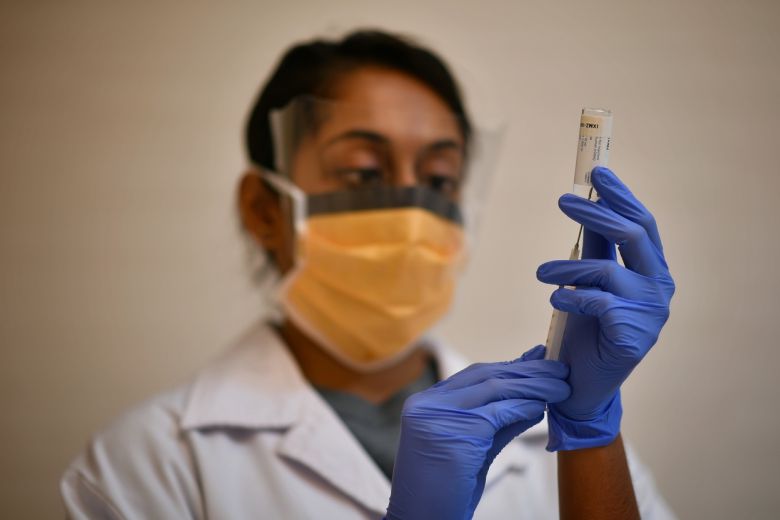ScienceTalk: Choosing Singapore's Covid-19 vaccines
Sign up now: Get ST's newsletters delivered to your inbox

A detailed study of how the immune system responds to a vaccine allows us to predict its efficacy.
PHOTO: ST FILE
Benjamin Seet and Ren Ee Chee For The Straits Times
Follow topic:
SINGAPORE - With more than 200 potential Covid-19 vaccines being developed globally, the world is inundated each day with news on the latest developments.
How to sift through the vast amount of information, to guide the pressing decisions on which vaccines to buy or use?
To put together Singapore's Covid-19 vaccine portfolio, an expert committee reviewed more than 40 vaccine candidates over the past seven months. This involved more than a hundred meetings with companies and academics, and a detailed study of thousands of pages of scientific papers, industry reports and protocols.
Balancing a vaccine portfolio
Covid-19 fuelled the development of an unprecedented number of vaccine platforms, some of which have never before been approved for use in humans.
These include traditional and well-tested approaches using inactivated whole viruses or fragments of virus protein, newer technologies employing nucleic acids (RNA or DNA) and viral vectors (riding on another virus to deliver a payload of coronavirus RNA to the immune system).
From the outset, it was important to address multiple concerns.
This includes which technologies make better vaccines, which are safer, which will become available earlier, and which are easier to manufacture, given that billions of doses are needed to protect entire populations.
There are already front runners attaining regulatory approval for conditional or emergency use.
These, however, may not eventually end up as the "best-in-class" in terms of safety or efficacy.
There are also concerns of vaccine nationalism, and fears that the export of vaccines may be stopped by governments and redirected to deal with their domestic situation.
Any vaccine portfolio has to be based on robust scientific and clinical evidence, and be adequately diversified to address political and operational considerations.
Dissecting the evidence
With every company in the race presenting its own version of a vaccine, it can be challenging to choose the best.
The primary consideration is whether a particular vaccine is safe to use.

Vaccines prepare the human body to fend off a real infection, and it is not uncommon for some people to experience fever or soreness at the injection site, though they tend to recover quickly. What may be of concern are the rare cases of serious reactions caused by the vaccine or the body's immune response. Some events are so rare that tens, if not hundreds, of thousands of people need to receive the vaccine before this happens.
So there is a need to weigh the risks of infection from Covid-19 against the rare likelihood of harm from vaccination.
Another important consideration is how well the vaccine works.
One way to measure this is the potency of antibody response.
Antibodies are proteins produced by the body that target and neutralise the virus. It is generally thought that the higher the level of such "neutralising antibodies", the better the protection provided.
Vaccines also work by activating immune cells, which play different roles.
Some immune cells help with the continuous production of antibodies, leading to longer-lasting protection, while others trigger "killer cells" which seek out and destroy virus-infected cells.
A detailed study of how the immune system responds to a vaccine allows us to predict its efficacy.
Preclinical studies, conducted in a laboratory using animal models, provide us with a glimpse of how the vaccine may perform in humans. Ideally, vaccinated animals achieve "sterilising immunity", where the immune response is potent enough to get rid of the virus completely.
Vaccines that show promise proceed to human clinical trials.
In clinical trials, both safety and efficacy of the vaccine are monitored closely.
These compare outcomes in people who receive the vaccine with those who receive a placebo. At the conclusion of the trial, the vaccine group should have far fewer cases of disease compared with the placebo group.
Recent reports show that both the Pfizer-BioNTech and Moderna vaccines can achieve a protection rate of about 95 per cent, which means that most people who get vaccinated will not get Covid-19, although there is a chance that they can still pass the virus on to others.
It is also important to find out how long the protection lasts.
Many recovered Covid-19 patients continue to have antibodies in their blood even six months later.
To determine how long vaccine protection lasts, clinical trials need to continue for at least two years.
Finally, clinical trials evaluate how well a vaccine works across different age groups, particularly the elderly, as well as patients with pre-existing diseases.
Practical considerations
Beyond laboratory tests and clinical trials, there are practical issues to grapple with.
The track record of the company is important, including whether it has the resources and experience to conduct multi-centre trials across continents, involving tens of thousands of participants; and its ability to scale-up manufacturing, and distribute vaccines globally.
There are companies with vaccine candidates backed by wonderful science, but lacking the means to take them all the way to the clinic.
Some vaccines require two or more doses, while a select few claim that a single dose provides adequate protection. Others require contents from different vials to be mixed just prior to vaccination.
With the need to administer millions of doses, each additional step creates its own set of challenges.
We also need to consider logistics.
A number of vaccines are unstable at room temperature and have to be shipped and stored at temperatures as low as minus 70 deg C.
This requires the set-up of an ultra-low-temperature freezer farm to house the vaccines, and tightly coordinated milk runs to distribute them to vaccination sites.

Pharmaceuticals covered by a thermal blanket to maintain low temperatures are loaded onto an SIA aircraft bound for Sydney on Dec 5, 2020.
ST PHOTO: KEVIN LIM
Finally, vaccines, being biological products, have a limited shelf-life. This determines how long they can be kept if not used immediately.
Through a systematic process of expert review and evaluation, the long list of vaccine candidates has eventually been whittled down to a handful.
Singapore's final portfolio balances considerations of safety, efficacy, timeliness, accessibility and implementability, while mitigating risks of failure.
This required close scrutiny of what was published, reading between the lines of what was not, and making tough calls based on the best available evidence.
Developments over the coming months will determine whether the right choices were made.
About the writers:
Professor Benjamin Seet is deputy group CEO (education and research) of the National Healthcare Group (NHG) and adjunct professor at the Lee Kong Chian School of Medicine, Nanyang Technological University.
Professor Ren Ee Chee is an immunologist and principal investigator at the Singapore Immunology Network, under the Agency for Science, Technology and Research (A*Star), and adjunct associate professor at the Yong Loo Lin School of Medicine, National University of Singapore.
Both writers are members of the Ministry of Health's expert committee on Covid-19 vaccination.

